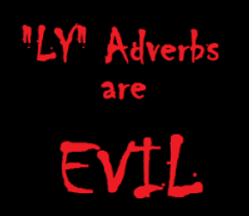Before my novel Murder in Palm Beach: The Homicide That Never Died was published, the outside editor for the publisher evaluated my work in six categories. She said I was a good story teller and praised me in five of them, but found fault in the sixth: adverbs. Too many of them, specifically of the ly
variety. Editors despise them, she said, declaring that some call for eliminating them entirely.
Never tell a ly
That, in my humble opinion, seems extreme, just as the late Elmore Leonard’s insistence on the word said in all instances of dialogue attribution goes too far. Throwing in a tag that shows emotion – retorted, for example – now and then, when the dialogue doesn’t show the manner of expression, not only clarifies, but also adds color to the writing. That’s merely a personal preference; there is disagreement on this point.
As to the matter of ly adverbs, it is difficult, if not impossible, to avoid them on occasion. How else do
you say, “He walked to the car slowly”? Okay, I suppose you might say, “He trudged to the car.” Here are two better ones: The stripper “walked mincingly” and “gracefully turned …” Those are from my novel, and I was darned if I could think of substitutes for those ly adverbs that painted the same picture.
What there should be no disagreement about are the phrases most important and more important. There is no reason to say or write most importantly or more importantly. Yet almost everybody does it, with the exception of some journalists. I must confess that in my early days as a newspaperman, I puzzled over which form to use. Finally, I came upon a grammarian’s explanation of why the ly should not be attached to important if it’s modified by most or more. Those are adverbs, and so is importantly. It’s okay for an adverb to modify another adverb, but in this case it’s excessive.
Et tu, journalists?

John Stossel
Journalists get it right more than other writers in any field I can think of, but by no means always. Here’s an example in a piece on price gouging by sellers of necessities in the midst of the carnage wrought by Hurricane Harvey in Houston. “More importantly,” columnist John Stossel of Creators Syndicate expounded in defense of hiking the prices for bottled water, “entrepreneurs have an incentive to move heaven and earth to bring water to the disaster area.”
Let’s dissect the phrase “More importantly.” Both words are adverbs. The phrase is short for “What is more important, …” Hence, the ly is unnecessary, and regarded by some as pompous. In fact, I venture to surmise that the current popularity of adding the ly came about because it sounded fancier to most ears.
Not everyone has succumbed to the trend, however. A pamphlet by AceCBD, a supplier of medical marijuana, contained this: “Even more important—CBD from the industrial hemp plant does NOT contain psychoactive THC.”
Alas, however, AceCBD touted one of its doctors as specializing in “preventative” medicine. Sounds a lot fancier than the word meaning exactly the same thing: preventive.

